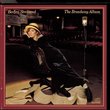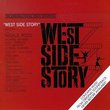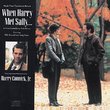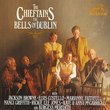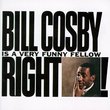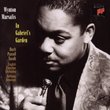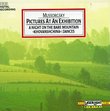| All Artists: Antonin Dvorak, Leonard Bernstein, New York Philharmonic Title: Dvorak: Symphony No. 9 "From the New World"; Carnival Overture. Slavonic Dances Nos. 1 & 3 Members Wishing: 0 Total Copies: 0 Label: Sony Release Date: 9/29/1998 Genres: Dance & Electronic, Classical Style: Symphonies Number of Discs: 1 SwapaCD Credits: 1 UPCs: 5099706056324, 074646056325 |
Search - Antonin Dvorak, Leonard Bernstein, New York Philharmonic :: Dvorak: Symphony No. 9 "From the New World"; Carnival Overture. Slavonic Dances Nos. 1 & 3
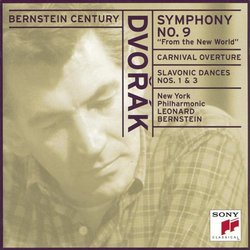 | Antonin Dvorak, Leonard Bernstein, New York Philharmonic Dvorak: Symphony No. 9 "From the New World"; Carnival Overture. Slavonic Dances Nos. 1 & 3 Genres: Dance & Electronic, Classical
This, the first of Leonard Bernstein's two recordings of this symphony, is vastly superior to his remake on DG. It's a vital, impulsive performance, with a daringly fast tempo in the Scherzo, and a very satisfying culminat... more » |
Larger Image |
CD DetailsSynopsis
Amazon.com This, the first of Leonard Bernstein's two recordings of this symphony, is vastly superior to his remake on DG. It's a vital, impulsive performance, with a daringly fast tempo in the Scherzo, and a very satisfying culmination in the closing pages. It's simply another reminder of what a reliable, and above all musical, conductor Bernstein was. This mid-price series, called "Bernstein Century," is a real collectors' edition. Great stuff. --David Hurwitz Similarly Requested CDs
|
CD ReviewsAn Emphatic 5 Stars! Trevor Gillespie | San Jose, California United States | 08/22/2000 (5 out of 5 stars) "Personally, I can't believe that I am the first person to review this Dvorak 9 on Amazon.com. I have grown a special affinity for the 9th Symphony of Dvorak. Previously, I have purchased many recordings of the 9th: two by Karajan, two by Kubelik, Maazel, Dohnanyi, Previn, and a few others. Although I have a like for all of these, something must be said of Bernstein's recording here. He brings to this symphony a spontaneous and crisp freshness. Many of the tympani rolls are emphasized a little more than other recordings. The third movement is something quite impressive. Immediately you can tell that the pace is faster than most other recordings. It doesn't sound rushed. Rather, it shows the skill of the New York Philharmonic and the pure fun that a Scherzo can be. As the symphony reaches its final notes, I can't help but have that same feeling of satisfaction that I had the first time I heard it live. Also, although this was recorded in the 60s, the sound is incredibly revealing. Don't be scared off if you're a hesitant buyer when it comes to non-digital' recordings." The NYPO and Bernstein at their peak J. Buxton | Waltham, MA United States | 01/07/2001 (5 out of 5 stars) "I enjoy this recording of the "New World" very much, perhaps more than any other of the half dozen or so recordings I have of the work (with the possible exception of Harnoncourt's recent recording with the Concertgebouw on Teldec). What is exceptional about this recording is its freshness and clarity and a sense of total involvement by the musicians. The louder and softer sections are heard equally well. I noticed this especially at the end of the famous Largo. If you judge a performance of this symphony primarily by this movement, there is much to enjoy here. All the tenderness is brought out wonderfully without over-sentimentalizing too much. The third movement scherzo is taken considerably faster than is conventional, but it is held together well and seems somehow the correct tempo. The Carnival overture is a little gem of a piece, also played well, and the dances are two of Dvorak's most well known." A CD full of ups and downs Joshua Kaufman | Cincinnati, OH | 01/07/2003 (3 out of 5 stars) "Dvorak's 9th is easily one of the most famous pieces of classical music, and certainly I share in the love that many have for this piece. I know it very well, and thus it's been hard to find a recording that truly agrees with me.
I hate to give such a difference of opinion here, but I really do not have the same opinion as most people seem to with this recording of Dvorak's 9th. The reason for this is mainly the second movement; for whatever reason, many conductors take this piece at a tempo that to my ears just seems very slow and pondering. Yes, it is an adagio, but it is also a very song-like melody that needs to flow, and Bernstein here simply does not put forth the forward movement that to me is needed here. In the 4th movement, also, he seems to slow and speed a bit too eclecticly that grates on me, though the music is marvelously played with wonderful brass. On the flip side, there are the first and third movements. Simply put, this is the finest rendition of the first movement I've ever heard. It contains all the enegery needed, and what is possibly my favorite musical moment ever -- the spot where there is a low flute solo at the end of the exposition -- is so beautiful I want to melt. So to the third movement is great, though perhaps a bit TOO fast (better too fast than too slow in this case, though), and if it weren't for the second movement's problems I'd say that these two movements make this a must buy. As for the rest of the CD, it too has ups and downs. On the up is the Carnival Overture, given a fine performance full of excitement and vigor. On the down, however, are the Slavonic Dances, which lack excitement and vigor, and like other parts of the CD are just too slow. Of course, I also think that the dances need to be heard in at least the set of 8 if not all 16. So I really can't recommend this CD, though I see that many people seem to enjoy it. My advice is that if you are like me and like the 2nd movement of the New World on the faster side, then stay far away." |

 Track Listings (7) - Disc #1
Track Listings (7) - Disc #1
